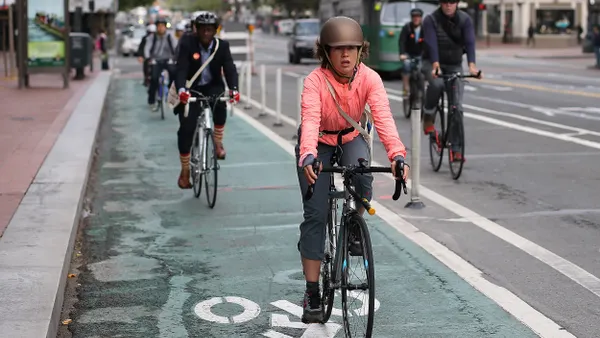Data has always played an important role for city planners and transportation departments but recently the thirst for data has increased exponentially. Maybe it’s the new forms of mobility appearing on city streets, maybe it’s the increased competition for the curb, maybe it’s all the new charging infrastructure popping up everywhere, or the rise of robot delivery devices on city sidewalks. Whatever the reason, the fact is that cities need data to manage every aspect of what happens on the streets, sidewalks, bike paths, bus lanes, curbs and more.
Today’s Cities and Data
Today’s cities, cities of tomorrow or smart cities…however you define your city, data plays a critical role in managing all that moves, rolls, rides, parks, idles, drops off, picks up and even flies in the public right of way. Urban dictionary (pun intended) defines a Smart City as “a technologically modern urban area that uses different types of electronic methods and sensors to collect specific data”. For argument’s sake, let’s say that most cities today identify as a Smart City or are inching closer and closer to being a Smart City by definition. This means that data from vehicles, sensors, cameras, parking meters, scooters, e-bikes, buses, trains etc. is being generated by the gallons and cities are thirsty for it. I liken this to walking into Costco at lunch time where free samples are the equivalent of ‘data’. I want it, I need it…I must have it!
Handle with Care
“Mobility companies and third-party data companies also have the responsibility to be purposeful with the data they collect. In granting permits, contracts, or other regulatory agreements that allow operations in the public right-of-way, cities can ensure that mobility companies have user agreements or privacy policies that are explicit with customers about what data they will collect and how they will use it” (National Association of City Transportation Officials and International Municipal Lawyers Association, April 2019).
Cities inherently have the power to regulate activities that occur in the public right of way. The power to regulate necessitates the use of data to inform cities and help create policies related to the use of streets, curbs and sidewalks. “With great power comes great responsibility,” which, according to Wikipedia, is an ancient adage, at least as old as the first century BC in the allusion of the Sword of Damocles. Uncle Ben also said this to Peter Parker in Spider Man, circa 2002 (starring Toby McGuire).

Cites often turn to third party data aggregators to help with the collection, analysis, and visualization of data. It is critical for cities to have a trusted partner when dealing with the aggregation of data. Often Blue Systems is the go-to data aggregation company chosen by cities to aggregate data. Founded in 2018, Blue Systems has grown to become one of the most sought-after SaaS companies in the Smart City space due to their wide-ranging capabilities and the high standards they have related to dealing with sensitive data. “We have always believed that Blue Systems should lead the way when it comes to data protection”, says CEO Christophe Arnaud. “Cities choose Blue Systems because of our cutting-edge software platform, but also because we have industry leading data protection standards” Arnaud went on to say. Blue Systems has recently achieved ISO 27001 certification, the international standard for data security which sets out the specification for an information security management system (ISMS).
How Much is Too Much
Yes, there is too much data being generated for most cities to realistically use at once. For this reason, cities need to think carefully and collect data that is meaningful and can be used to inform decisions for the greater good of the residents they serve. In other words, each data collection should be dictated by the actual and identifiable need for regulation, urban planning and policy making by city officials.
According to a NACTO publication, “A fundamental responsibility of city government is to ensure safe passage on public rights-of-way, protect public health, safety and welfare, and govern activity in the public streets. To fulfill this responsibility, city governments need access to information about what is happening in the public street and how it might impact safety, health, equity, environmental outcomes, and the distribution of people and resources” (National Association of City Transportation Officials and International Municipal Lawyers Association, April 2019).
Irina Slavina oversees data protection policies and procedures Blue Systems has in place to ensure city data the company processes is most secure. She serves on the Open Mobility Foundation (OMF) Security, Privacy & Transparency Committee which was formed to protect privacy at every step of the way for the MDS. In November 2021, the OMF together with NABSA and NUMO promulgated Privacy Principles of Mobility Data “to help guide the mobility ecosystem in the responsible use of data and the protection of individual privacy". “We were the first private mobility data company to endorse the Principles,” Irina said. “It is personal to us as we all live in large urban environments and use new forms of mobility – no one would want their location data misused,” added Irina, “and that is why we go above and beyond as an organization to ensure utmost data protection for our city customers.”
Charging Forward with Data
Mobility data was forever changed in 2018 when MDS was developed by the Los Angeles Department of Transportation (LADOT) in response to the rather quick evolution of micromobility in dense urban environments like Los Angeles. While MDS has occupied the spotlight for the last several years, it was not the first type data type to use APIs for exchanging data between mobility operators and cities or other regulators, and it won’t be the last. The OMF now oversees MDS and is responsible for future iterations and advancements of the data specification. The OMF consists of cities and private organizations which are all committed to the advancement of data standards which allow cities and private mobility operators to exchange data and work together for the common good.
Curb Data Specification (CDS) is the newest data specification born from the work at the OMF. “CDS gives local governments the tools to drive data-informed change. It allows cities to map curb regulations and capture data about how the curb is used. Capturing those insights allows policies to adapt to deliver the most public value. As a common standard, CDS unlocks an ecosystem of tools being built to help cities manage the digital curb and communicate digitally with curb users” (2022 Open Mobility Foundation®). CDS will increase the amount of data as well as the quality of data available to cities. This is great news for data thirsty cities eager to take advantage of this new data coming from the curb.
As cities continue to quench their thirst from the proverbial firehose of data, companies like Blue Systems stand ready to deliver the necessary technical tools to enable cities to effectively process and analyze this data. Christophe Arnaud from Blue Systems added, “our Smart Mobility Data Platforms are fully capable of ingesting and analyzing all types of data including mobility, parking, charging infrastructure, cameras/sensors and curb. We like to think of ourselves as a one stop data aggregation partner for cities”.










